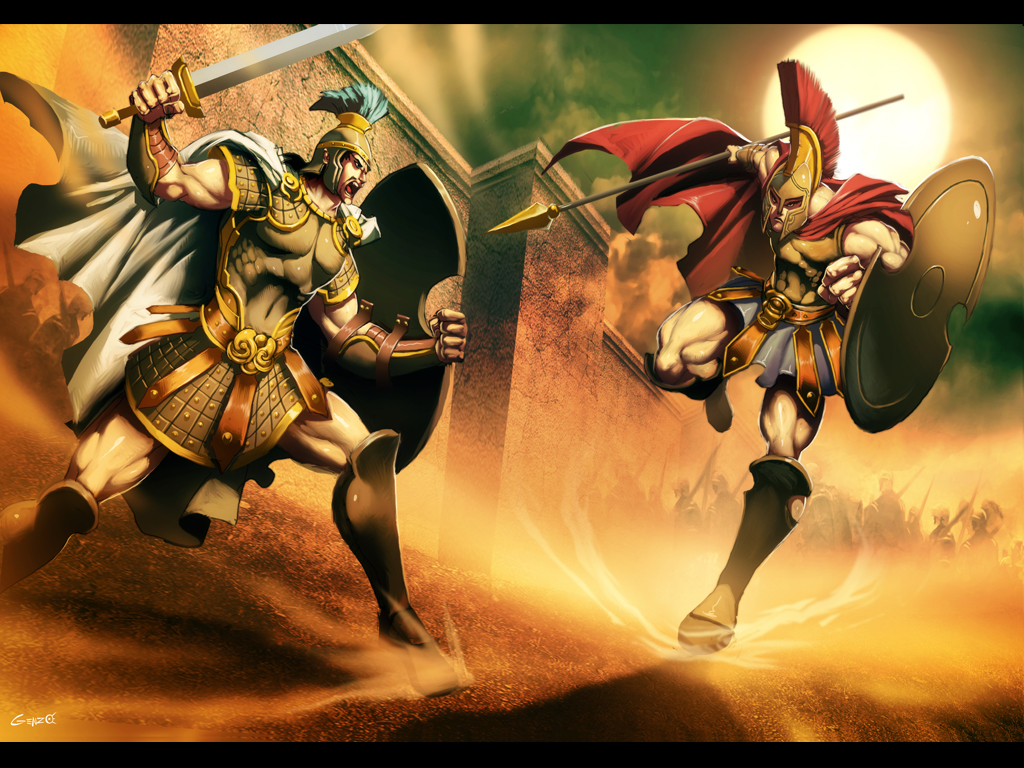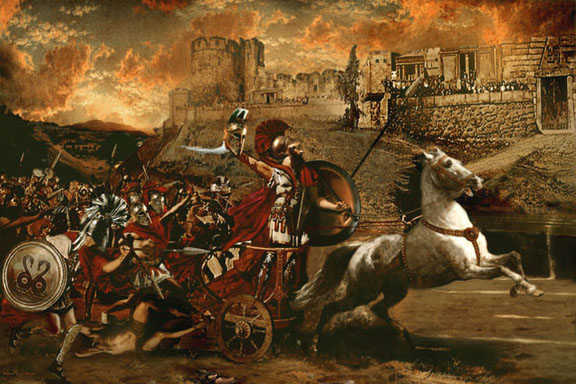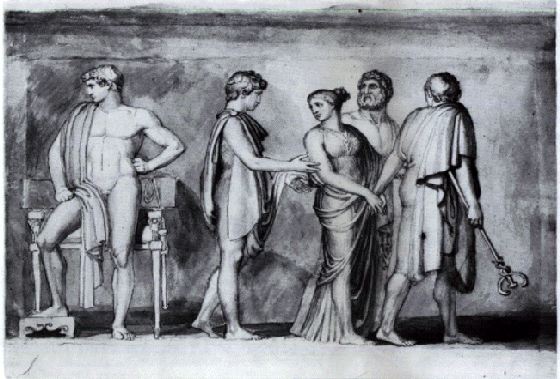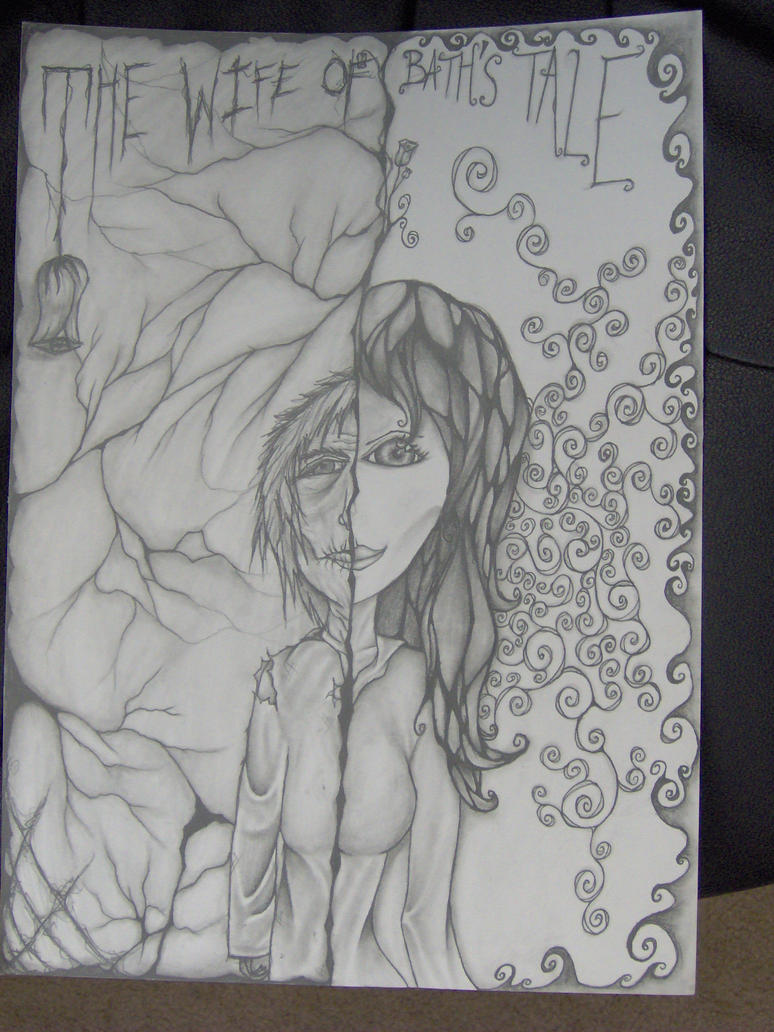Today I would like to talk about Homer's The Iliad. Last year I listened to The Iliad followed by the Odyssey, Followed by the Aeneid. Now The Iliad I remember better because I have read it at least twice, and what I want to talk about is whether or not it follows something my cousin
Turner said as a reply on his wife's blog post about Literature. This is what he said:
Throughout history, the best loved and followed stories have always either been allegorical for 1 of 2 stories; Jesus Christ the Messiah or The Holy Grail.
We discussed this for a little (and I mean a little bit) before he basically said 'Meh I'm right, you are just silly.' that is not a direct quote but that was I got out of what he said. I think because one of his examples was Disney that he believes that the Messiah story was that there was someone who was being held against their will and a savior had to go and save that person. he also said that his belief was that the Holy grail was really Royal blood, but that argument is for another day after I have actually read the grail and Authorial Narratives.
Now I want to continue the argument in saying that the Iliad does not propagate the Messiah story, or rather that it tells an anti messiah story. (I don't know if Turner reads my blog, I think his wife does so this could be a very one sided but hey. Oh and Turner if you do stop by I would love to hear your thoughts.)

So what I am going to do is use the story of Hosea as a general guide for a messiah story. just to summarize, Hosea is a prophet who is told by God to go and marry a prostitute, and he is told that she will be unfaithful to him. and she does, at one point Hosea has to go to the slave market and buy her back. This story is meant to be an allegory, Hosea is playing the part of God and his wife -Gomer, what an unfortunet name-is playing the par of God's people.

Now when looking at the Iliad, at first glance I would say there is nothing in this book that has those themes. the book is focused on a war between the Greeks and the Trojans. Particularly about one very famous hero Achilles, his fight against the Mighty Hector, and how he earned honor, glory, renowned, and immortality. And those things are very important because that is what the book is about. Oh and I will talk about that next week. but this week I am going to talk about two minor stories that are either back story to the text or motivation for why things happen in the book the way they do.

First we are going to talk about Helen of Troy. because I think this is the first place someone could go if they wanted to say that the Iliad has Messianic themes. Helen is the wife of Menelaus, She is whisked away by Pairs of troy, and Menelaus takes an army to Troy to get her back, to destroy Troy for daring to steal his wife. This would seem to fit the story. a good man who has taken a beautiful wife who is tempted to run away with someone else and her husband comes after her. That is the story of Hosea right?
But lets take a closer look. Do you know how Helen became Menelaus's wife? well that depends on what story you want to believe. According to my good buddy the Myth Man She was abducted at the age of twelve by Theseus and his pal Peirithous. At age twelve! they then did a little coin toss to find out which one of them was going to be the lucky guy to marry her, when she comes of age of course. But Thesesus and Peirithous went missing with enough time for her brothers to rescue her. Now safe in her father's house the suitors come a calling. they are all enamored over her legendary beauty and are willing to fight and kill over her. Luckily for everyone involved, Odysseus comes up with a great plan, all the suitors will take the Oath of Tyndareus, which says that they will defend to the death whoever becomes Helen's husband. And with that the auction is opened. Menelaus wins, he pays the check to her father and takes her home.

There is a great moment in the movie Helen of Troy that I think sums up Menelaus's feelings for his new bride. At a great feast he orders her to walk across a table where all his guests are lounging bare breast naked. his guests are the suitors who loss, and I believe in the movie this is where Paris sees Helen for the first time-but I don't quite remember. Now up to this point I would be willing to agree that possibly the Iliad could have this messianic theme of the Rescuer coming after his love but here is where it all breaks down. In the prophets we often here about God refer to Israel as his lover, whom he clothed and protected, who is precious to him. Menelaus shows us the opposition here. She is his possession, he won and all his piers lost, now he must show them what they are all missing out on. He strips and parades her around saying "look what I got, isn't she pretty? and she is all mine, my beautiful trophy, look don't touch guys."
 |
I chose this because Orlando is
probably the most hansom
Paris there has ever been |
But then Paris comes along. Now Maybe we could say that Paris is the Messiah figure he loves Helen and is willing to risk the destruction of his city and country for her. Or is he just one more man who must possess her no matter what the cost? Let me ask you how did Paris come to have Helen? Oh yeah, Aphrodite gave her to him.
You know the story right? how Paris has to judge who is the most beautiful of the three goddesses: Athena, Aphrodite, and Hera. How does a mortal choose? by hearing what he gets out of it, and Aphrodite told him he could have the most beautiful women in the whole world if he said that she was the most beautiful of them all. What do you think he did? Yep you guessed it. So Aphrodite made it so Helen agreed to run away with Paris. Truly I don't know why you wouldn't take the first opportunity to run away from a husband like Menelaus.
But is Paris her messiah, is he the one she loves? A moment from the Iliad would say otherwise, after Paris has run like a whiny baby back to his room she tells him he is a coward- quite a low blow considering the book is about honor and glory through battle. but he tells her to shut up and lie down on the bed with him. Another lover who values her only for her looks, a prize, a trophy.
Helen's fate is a confused. one it seems that many authors have continued this idea that she is continually abducted by strangers, Before she is killed by a slighted wife. another say that she is put into captivity with the other women taken from troy. Virgil's the Aeneid claims that she assisted the Greeks in their taking of the city, while homer claims that she tortures the men hiding inside the horse by mimicking their wives voices.

So does Helen provide the the themes needed for a messiah story as my cousin would claim is in every book? there are two ways you can look at it. lets say that Menelaus is the Rescuer. his wife was after all spirited away from him. And he goes to war to get her back...or does he? More likely he is going to war to avenge his wounded pride. Helen is just the symbol of that pride. Is Pairs the Rescuer? I mean the Movie Troy portrayed them as to lovers who happened to be caught in the middle of a terrible set of circumstances. In that case he is a lousy rescuer, troy falls and he dies in battle leaving her to go back to the hell she he rescued her from.
This is why I say this is an Anti-messiah story. The messiahs who are available are selfish men who abuse the one they abducted. Helen was only safe when she was a child. From then on she is at the mercy of the men who lay claim to her and the gods. She has no knight in shining armor to rescue her only to accept her fate. if anything this story reminds women that they need to be self reliant because no one will be there when they are in need.
The thing is, all this is back story to the Iliad, it is not what the Iliad is about, but I'll talk about that eventually. next I must look at a second women who is tied up in this mess.
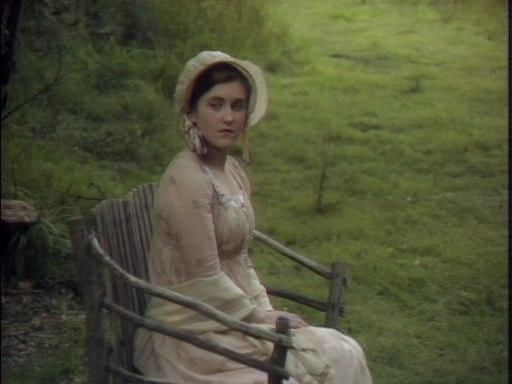 1. Fanny is the complete opposite of the other Jane Austen Heroines. a. where Maryanne is loud and active seeking adventure Fanny is quiet and often prefers to sit and be. b. Where Elizabeth voices her opinion often with those who will share her opinion and join in her mirth fanny only confides her opinions to her cousin preferring not to vocalize her judgments in hopes that she is miss informed. c. where Emma enjoys being the center of attention Fanny prefers to let others take the lead. The only Heroine she is very much like is Jane Bennett but she has no Lizzy to stand by her nor is she surrounded by a loving family. She is much like Elanor Dashwood but she receives less thanks for her sacrifices and again has no one who supports her.
1. Fanny is the complete opposite of the other Jane Austen Heroines. a. where Maryanne is loud and active seeking adventure Fanny is quiet and often prefers to sit and be. b. Where Elizabeth voices her opinion often with those who will share her opinion and join in her mirth fanny only confides her opinions to her cousin preferring not to vocalize her judgments in hopes that she is miss informed. c. where Emma enjoys being the center of attention Fanny prefers to let others take the lead. The only Heroine she is very much like is Jane Bennett but she has no Lizzy to stand by her nor is she surrounded by a loving family. She is much like Elanor Dashwood but she receives less thanks for her sacrifices and again has no one who supports her. 2. Mansfield Park places goodness, selflessness, and love in contrast to Pleasure, Selfishness, and Apathy. it is in many ways a treaties against hedonism which in a culture chasing after the new shiny gadget or new experience is not popular. This is similar to the preference of Batman to Superman. (I know that in many circles this is not true but Let us look at these two super heroes in light of thier current visablity in the motion picture industry Batman has had two very sucsessful films and a third which will probably be a resounding crescendo to the build up of the last two films. Superman has had one film and as far as superhero movies go... well lets just say it wasn't as bad as the second fantasic four moive or the two Hulk Movie attempts.) Being Good and seeing the faults in others is judgmental. Fanny is a representative of Goodness, by being so she stands in judgement over her Shallow cousins, what is forgotten is that she loves this family who took her in, and she shows that love by serving them. not to get 'religious' on everyone but that is what Christian love should look like. To actually unpack that thought would probably take a series of blog posts but I will try to sum it up by pointing you to an act of Jesus during the last supper, he took on the garb of a slave and washed his disciples feet then told them to do like wise.
2. Mansfield Park places goodness, selflessness, and love in contrast to Pleasure, Selfishness, and Apathy. it is in many ways a treaties against hedonism which in a culture chasing after the new shiny gadget or new experience is not popular. This is similar to the preference of Batman to Superman. (I know that in many circles this is not true but Let us look at these two super heroes in light of thier current visablity in the motion picture industry Batman has had two very sucsessful films and a third which will probably be a resounding crescendo to the build up of the last two films. Superman has had one film and as far as superhero movies go... well lets just say it wasn't as bad as the second fantasic four moive or the two Hulk Movie attempts.) Being Good and seeing the faults in others is judgmental. Fanny is a representative of Goodness, by being so she stands in judgement over her Shallow cousins, what is forgotten is that she loves this family who took her in, and she shows that love by serving them. not to get 'religious' on everyone but that is what Christian love should look like. To actually unpack that thought would probably take a series of blog posts but I will try to sum it up by pointing you to an act of Jesus during the last supper, he took on the garb of a slave and washed his disciples feet then told them to do like wise.
